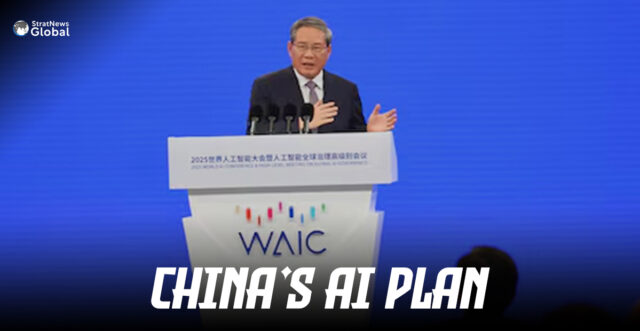China announced on Saturday its intention to establish an organisation promoting global cooperation on artificial intelligence (AI), positioning itself as a counterweight to U.S. influence over the emerging technology.
China wants to help coordinate global efforts to regulate fast-evolving AI technology and share the country’s advances, Premier Li Qiang told the annual World Artificial Intelligence Conference in Shanghai.
President Donald Trump’s administration on Wednesday released an AI blueprint aiming to vastly expand U.S. AI exports to allies in a bid to maintain the American edge over China in the critical technology.
Li did not name the United States but appeared to refer to Washington’s efforts to stymie China’s advances in AI, warning that the technology risked becoming the “exclusive game” of a few countries and companies.
China wants AI to be openly shared and for all countries and companies to have equal rights to use it, Li said, adding that Beijing was willing to share its development experience and products with other countries, particularly the “Global South”. The Global South refers to developing, emerging or lower-income countries, mostly in the southern hemisphere.
How to regulate AI’s growing risks was another concern, Li said, adding that bottlenecks included an insufficient supply of AI chips and restrictions on talent exchange.
“Overall global AI governance is still fragmented. Countries have great differences particularly in terms of areas such as regulatory concepts, institutional rules,” he said. “We should strengthen coordination to form a global AI governance framework that has broad consensus as soon as possible.”
Shanghai Headquarters
The three-day Shanghai conference brings together industry leaders and policymakers at a time of escalating technological competition between China and the United States – the world’s two largest economies – with AI emerging as a key battleground.
Washington has imposed export restrictions on advanced technology to China, including the most high-end AI chips made by companies such as Nvidia and chipmaking equipment, citing concerns that the technology could enhance China’s military capabilities.
Despite these restrictions, China has continued making AI breakthroughs that have drawn close scrutiny from U.S. officials.
China’s Vice Foreign Minister Ma Zhaoxu told a roundtable of representatives from over 30 countries, including Russia, South Africa, Qatar, South Korea and Germany, that China wanted the organisation to promote pragmatic cooperation in AI and was considering putting its headquarters in Shanghai.
The foreign ministry released online an action plan for global AI governance, inviting governments, international organisations, enterprises and research institutions to work together and promote international exchanges, including through a cross-border open source community.
The government-sponsored AI conference typically attracts major industry players, government officials, researchers and investors.
Saturday’s speakers included Anne Bouverot, the French president’s special envoy for AI, computer scientist Geoffrey Hinton, known as “the Godfather of AI”, and former Google CEO Eric Schmidt.
Tesla CEO Elon Musk, who has in past years regularly appeared at the opening ceremony in person or by video, did not speak this year.
Besides forums, the conference features exhibitions where companies demonstrate their latest innovations.
This year, more than 800 companies are participating, showcasing more than 3,000 high-tech products, 40 large language models, 50 AI-powered devices and 60 intelligent robots, according to organisers.
The exhibition features predominantly Chinese companies, including tech giants Huawei and Alibaba and startups such as humanoid robot maker Unitree. Western participants include Tesla, Alphabet and Amazon.
(With inputs from Reuters)





